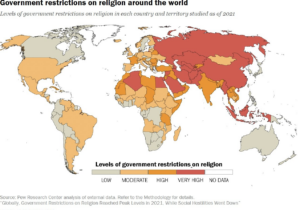North Koreans are not permitted to believe in any authority beyond Kim Jong-un, their erratic maniacal despot, and the two predecessors in his dictatorial family line.
However, an estimated 300,000 North Koreans (according to Open Doors UK) choose to believe that Jesus, not Kim Jong-un, is their savior. They practice their faith despite the potential consequences of torture, execution, or a life spent in labor camps.
Ironically, the North Korean capital of Pyongyang was known as the “Jerusalem of Asia” at the start of the 20th century, when North Korean Christianity was in bloom and some 3,000 churches were built nationwide.
Though previous years had seen incidents of anti-Christian violence, by the late-1800s, both Protestant and Catholic missionaries on the Korean Peninsula were enjoying success. Not only were they winning converts, but they built schools and hospitals, and improved the overall quality of life.
When the Japanese annexed the territory in 1910, organized anti-Christian persecution took place. However, this persecution—which ended when Japan surrendered in 1945—was mild compared to that perpetrated by Kim Il-sung, who took over when the Japanese left.
The majority of Christians fled to South Korea at the end of World War II. It was a good decision. The ensuing Korean War brought misery to millions, Christian or otherwise, and Kim Il-sung’s anti-Christian position only intensified after the war. His virulence against religious believers was maintained during the rule of his son, Kim Jong-il, and exists today with the rule of his grandson, Kim Jong-un.
Pyongyang, the former “Jerusalem of Asia,” now has four state-sanctioned churches (two Protestant, one Roman Catholic, and one Russian Orthodox).
According to the Association of Religion Data Archives, visitors to North Korean churches related how “congregations arrived at and departed services as groups on tour buses.” Contact between these “congregations” and foreigners was not allowed.
It’s quite evident that these churches are a front. “All worship is in secret. Legitimate Christianity is banned in North Korea,” says David, who works for the UK-based Christian rights group Open Doors, and whose full name remains a secret for security reasons.
For the 14th consecutive year, Open Doors has ranked North Korea as the world’s most dangerous place for Christians. “Undoubtedly, there is no harder place to be a Christian,” says David, who estimates that some 70,000 North Korean Christians are currently held in labor camps. Figures for how many have been executed are unknown.
When Kim Jong-un took over as supreme leader subsequent to the December 2011 death of his father, some wondered if there would be any decrease in the level of tyranny. There hasn’t been. “As far as we know the situation is the same as before—terrible,” says David.
Though the political situation currently shows no signs of changing for the better, David says that he and his colleagues “strongly believe that one day the church will be free to evangelise in a more open way, and that is why those who believe often choose to stay in North Korea.”
Since the 1950s, North Korea has operated on a system called “Songbun,” comprised of three main groups—based according to their loyalty to the Kim family dynasty—a loyal “core class,” a “wavering class,” and a “hostile class.” Religious believers are designated as part of this “hostile class.”
If someone is discovered to be religious, the consequences can affect three generations: the believer, the believer’s parents, and the believer’s children are all eligible for punishment.
Punishments are given to Christians “vary arbitrarily,” according to Zoe Smith and Stephen Rand’s December 2014 report “Religion and Belief in the Democratic People’s Republic of Korea.” Some might be executed in public, while others are sent to a labor camp. Many might prefer the first scenario. One woman, whose labor camp job was to remove feces from latrines, testified that, “Several times the guards made her lick off excrement that had spilled over in order to humiliate and discipline her,” according to the United Nations Commission of Inquiry on Human Rights.
Apparently, there are labor camps harsher than the one she went to. The most notorious is Kwan-li-so [penal labor colony] No. 15 – a facility also known as the Yodok concentration camp, where an estimated 6,000 North Korean Christians are held captive.
Civilians in North Korea are instructed to keep watch on each other and report incidences of disobedience, such as Christian worship. There are many agents working on behalf of the government who are trained to look for things “such as a person who remains silent with closed eyes and meditates, or when habitual smokers or drinkers quit smoking or drinking all of a sudden,” according to the Open Doors 2014 report “Voices from North Korea’s largest underground movement: the secret church.” The report also tells how spies are “commissioned to set up fake, ‘secret’ prayer meetings to attract Christians.”
Christians in North Korea are aware that agents are on the prowl for them. They also know that although conditions are severe for every inhabitant of a North Korean labor camp, the despised Christian prisoners are given “special treatment” and “kept in isolation from other people,” according to the same report.
Interrogations of Christians are conducted under torture in effort to coerce them to reveal the identity of other Christians. Additionally, guards are given promotions for forcing prisoners to renounce their Christianity. And there are various methods to accomplish this. Among them include visits to an “electrical torture room,” according to the Open Doors report, which adds how one former Christian prisoner was taken to a room with “ropes on the ceilings” where he was “hung upside down” and “beaten with wooden sticks.” He would pass out, only to be revived with douses of cold water.
The Database Centre for North Korean Human Rights reports that 99.7% of refugees said that there is “no religious freedom in North Korea.” And yet Christianity apparently is on the rise in North Korea, growing at an annual rate 5.2%, according to Operation World.
“Hopelessness is rampant. The so-called gods that lead North Korea have died,” says Todd Nettleton, the Director of Media and Public Relations for the U.S.-based Christian rights group Voice of the Martyrs (VOM). He adds that, “North Koreans see the cracks in what the regime is telling them, and they are open to a different message.”
Last year, Nettleton interviewed a young North Korean man whose mother was killed after she was caught with a Bible. Nettleton’s organization also had been in contact with a group of North Korean Christians who were in a photography business. They reportedly were discovered by the government, and haven’t been heard from again.
“Following Jesus Christ isn’t just a ‘foreign’ religion, it really amounts to treason in that belief in Jesus undermines the very veracity of the North Korean government and system,” says Nettleton.
Even though their country is the most tyrannically anti-Christian on earth, “the North Korean Christians that we deal with don’t talk about it in those terms,” he says. “They focus instead on serving the Lord and walking in his footsteps.”
There is little incentive in this world for a North Korean to choose to follow Jesus. Yet 300,000 of them do so, and every last one lives dangerously close to martyrdom.
—
Ray Cavanaugh is a freelance writer from Boston. He enjoys long walks, short novels, and keeping tabs on faraway places.
Photo Credit: The statues of Kim Il Sung (left) and Kim Jong Il on Mansu Hill in Pyongyang, North Korea. By J.A. de Roo via Wikimedia Commons.







 Live in the DC area? Sign-up for Providence's in-person events list!
Live in the DC area? Sign-up for Providence's in-person events list!